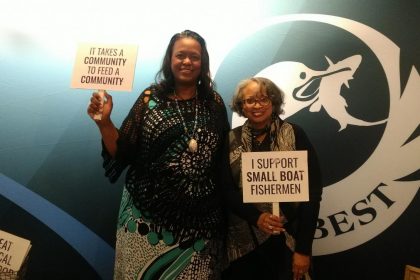
Race and equity are concerns in all parts of our society, and the food system is no different. From food apartheid to low wages, the food system reflects discrimination in zoning, education, housing, labor protections, and in electoral representation. Identifying what we can do to unravel systemic oppression, and then aligning our institutions to take up the tasks, is a challenge for any organization and community. And yet, many are stepping to the challenge, including groups like Food Solutions New England (FSNE) and the Northeast Sustainable Agriculture Working Group (NESAWG).
Nowhere is this commitment more visible than in NESAWG’s upcoming It Takes a Region conference in Baltimore. Concerns for racial and equity not only determined the site and communities centered at the conference, but shaped who would be in the room. NESAWG committed to funding scholarships for people of color, Chesapeake region locals, urban growers, and youth especially, all with an eye towards moving beyond what has historically been a majority white group of participants. NESAWG sees this as vital to closing the gap between the groups historically represented in the food movement and those who have been marginalized and are most negatively impacted by the food system. Race and equity programming, including an urban farm tour, a plenary with the Black Church Food Security network, and case studies from Groundswell Center for Local Food and Farming, Massachusetts Avenue Project, DC Greens, Crossroads Food Network, and many more!, grounds the conference in the real-life work of advancing racial justice in the food system. FSNE Ambassador and Process Team member and NESAWG Board member Karen Spiller, along with other advocates, is leading a Racial Equity breakfast discussion, and FSNE Network Team members are presenting on everything from the Milk With Dignity campaign to a session specifically on Creating a Culture of Equity and Belonging for a Sustainable Food Future.
Such focus and breadth of work by both FSNE and NESAWG is no accident. Moving from theory to practice has been an important part of the work in both networks.
“We together have been building relationships and weaving the threads of racial equity, binding us more closely and intentionally across and among our Northeast region,” says Karen, “Being in Baltimore this year provides a powerful moment of place-based learning and demonstrates our need to stay a while in these spaces. Our shared commitment to equity in our food system, and in all systems that intersect with our goal of healthy equitable food for all, remains non-negotiable!”
Of course, what we do in conferences matters, but what really counts is what we do when we go home. Do we take these lessons and apply them to our CSAs and food hubs? Do we readjust our hiring practices or funding priorities for our networks, our farms, or our universities? Racial justice really will take a region, and more, to achieve. Come out to the NESAWG conference to join the discussion, meet others who will support you in your work, and plug into the incredible work of the many practitioners within FSNE and NESAWG who are committed to racial equity. Learn more by visiting nesawg.org/conference.
Cheyenna Layne Weber is the Communications Manager for NESAWG.




